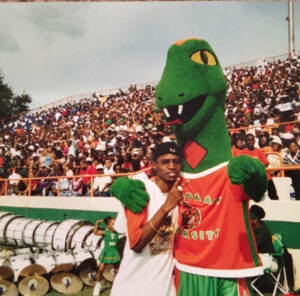
Photo courtesy: @braggintime
Florida A&M University, affectionately known as “he Hill,” is widely recognized for its homecoming festivities. Generations of old, new and aspiring Rattlers flock to Bragg Stadium annually in celebration of FAMU’s legacy.
Yet, as a result of the coronavirus pandemic, incoming students are forced to adjust to a different FAMU experience — one without homecoming for the first time in several decades.
Aside from returning students, freshmen and alumni have also been known to highlight homecoming as their premier FAMU experience.
Recent graduates of the university play a large role in the preservation of student activity. The season of homecoming affords alumni with the opportunity to network and congregate with younger generations.
“Homecoming is an opportunity to celebrate Black excellence and have fun. An opportunity to take some time out from your studies and just enjoy yourself, your company and all different types of Black people of different ages. Enjoy it happily and laugh. It’s a beautiful time, especially when the social and political climate seems as if we are getting challenged from every angle. This is a time for us to be together, unified and just have fun. Yet, it feels like that’s being taken away from us,” said Fure Muhammad, a graduate of the FAMU-FSU College of Engineering.
In ideal circumstances, the fall semester would signify the influx of freshmen, student facilitated events and the beginning of football season. The new reality students face, however, consist of remote instruction, limited social interaction and campus-wide curfews.
These measures, although necessary precautions are leading students, like Carrington Whigham, a junior journalism and theatre major, to reform her outlook on the FAMU experience.
“I think because the (social) climate is so insecure right now the student body has adapted to the fact that in-person events are not feasible. However, I do know that the recognition homecoming brings to our school is a great sport that captivates national attention. I think the climate is understandable regarding the fact that there will be no homecoming but I do agree that the aspect of student engagement will be missing for incoming students,” Whigham said.
Whigham, also the vice president of the Student Government Association and a third-generation Rattler, is all too familiar with the traditions associated with FAMU homecoming. Hence, she understands that with her duties as the coordinator for homecoming season there will be a void left to fill within students.
When asked about the possibility of a virtual homecoming or alternative student activities, Whigham said, “We are trying to be as strategic as possible and safe to make sure that there is some student engagement.
“We plan to optimize our virtual platform by staying creative and making sure that the needs of the students are always met,” she added.
The environment, for students accustomed to life on the Hill prior to the coronavirus is very unwelcoming. However, many incoming freshmen have adopted an optimistic approach to their experience at FAMU.
Tiara Williams, a first-year journalism major, recognizes that being afforded on-campus experiences is a privilege.
“I feel like it (homecoming) has been taken away from me. I didn’t get to graduate and I didn’t get a trip so I’ve gotten used to disappointment. I’m just happy to be on campus,” Williams said.